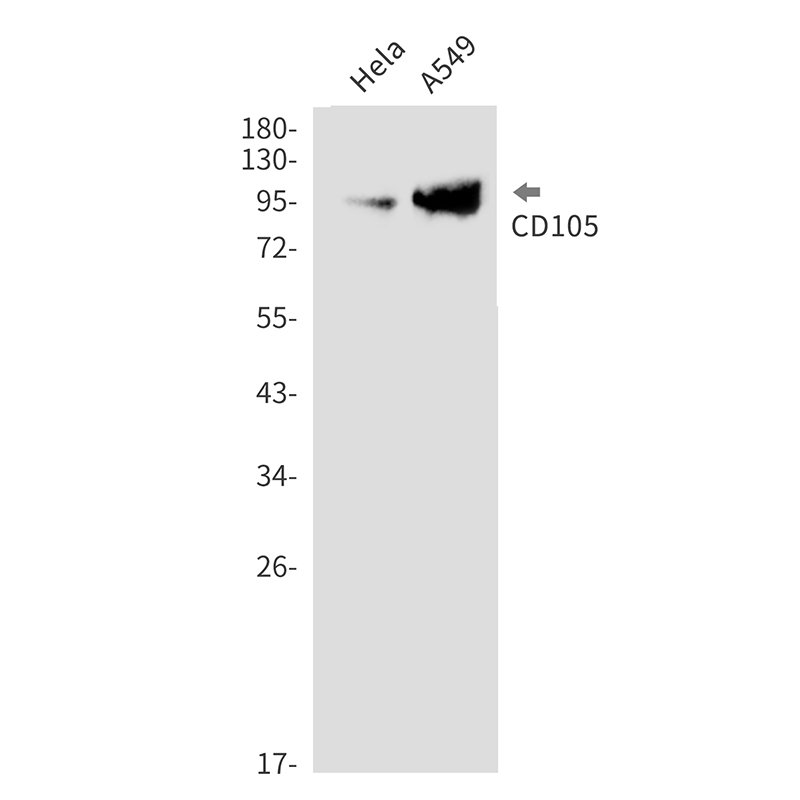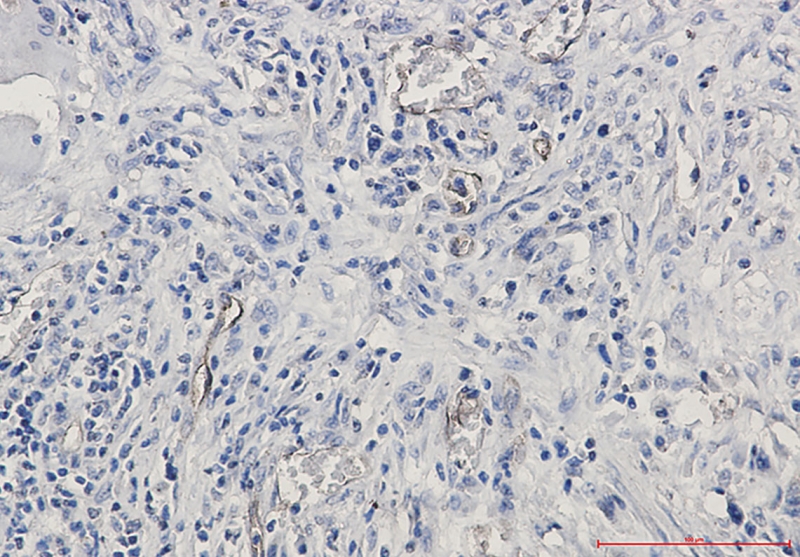

| WB | 1/500-1/1000 | Human,Mouse,Rat |
| IF | 1/20 | Human,Mouse,Rat |
| IHC | 1/50-1/100 | Human,Mouse,Rat |
| ICC | 技术咨询 | Human,Mouse,Rat |
| FCM | 咨询技术 | Human,Mouse,Rat |
| Elisa | 咨询技术 | Human,Mouse,Rat |
| Aliases | ENG; END; Endoglin; CD antigen CD105 |
| Entrez GeneID | 2022 |
| WB Predicted band size | Calculated MW: 71 kDa; Observed MW: 95 kDa |
| Host/Isotype | Rabbit IgG |
| Antibody Type | Primary antibody |
| Storage | Store at 4°C short term. Aliquot and store at -20°C long term. Avoid freeze/thaw cycles. |
| Species Reactivity | Human |
| Immunogen | Recombinant protein of human CD105 |
| Formulation | Purified antibody in TBS with 0.05% sodium azide,0.05%BSA and 50% glycerol. |
+ +
以下是关于CD105抗体的3篇参考文献示例(内容为模拟生成,仅供参考):
---
1. **文献名称**:*CD105 is a marker of tumour vasculature and a potential target for cancer therapy*
**作者**:Duff, S.E., et al.
**摘要**:该研究证实CD105在多种实体瘤的新生血管内皮细胞中特异性高表达,而在正常组织血管中表达较低。作者提出抗CD105抗体可用于靶向肿瘤血管的分子影像或药物递送系统。
2. **文献名称**:*Endoglin (CD105) as a prognostic marker in colorectal cancer*
**作者**:Li, C., et al.
**摘要**:通过免疫组化分析发现,CD105标记的微血管密度(MVD)与结直肠癌患者的转移风险及生存率显著相关,提示其作为预后生物标志物的临床价值。
3. **文献名称**:*Anti-CD105 antibody conjugated nanoparticles for targeted drug delivery in breast cancer*
**作者**:Zhang, Y., et al.
**摘要**:研究开发了一种CD105抗体偶联的纳米颗粒,可特异性结合乳腺癌血管内皮细胞并释放化疗药物,动物实验显示其显著抑制肿瘤生长并降低全身毒性。
---
如需真实文献,建议通过PubMed(https://pubmed.ncbi.nlm.nih.gov)搜索关键词“CD105 antibody”或“endoglin therapy”获取最新研究。
CD105 antibody targets the CD105 protein, also known as endoglin, a transmembrane glycoprotein highly expressed on vascular endothelial cells. As a co-receptor in the transforming growth factor-beta (TGF-β) signaling pathway, CD105 plays a critical role in modulating cellular responses to TGF-β1 and TGF-β3. influencing processes such as angiogenesis, inflammation, and tissue repair. Its overexpression is associated with proliferating endothelial cells in tumors and pathological vasculature, making it a key marker for studying angiogenesis and vascular remodeling.
In research, CD105 antibodies are widely used to identify and isolate endothelial cells in heterogeneous tissues, particularly in cancer studies where tumor neovascularization is a focus. These antibodies are essential tools in flow cytometry, immunohistochemistry, and immunofluorescence to visualize vascular networks or quantify microvessel density. Clinically, CD105 has emerged as a prognostic biomarker in cancers, as elevated expression correlates with metastasis and poor outcomes. Additionally, CD105-targeted therapies, including antibody-drug conjugates and immunotherapies, are under investigation for their potential to inhibit pathological angiogenesis.
The development of CD105 antibodies has advanced diagnostic and therapeutic strategies in oncology and vascular diseases, though challenges remain in optimizing specificity and minimizing cross-reactivity with other TGF-β receptors. Ongoing studies continue to explore its dual role in pro- and anti-angiogenic signaling, highlighting its complexity in disease contexts.
×